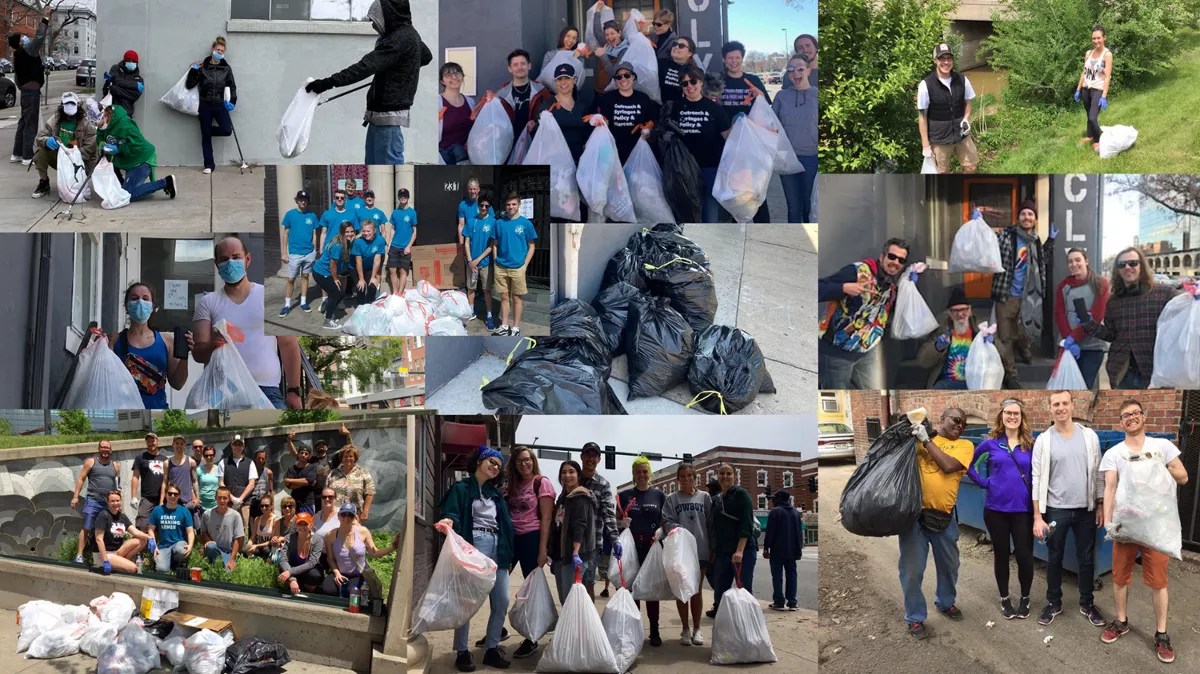
Courtesy of the Harm Reduction Action Center

Audio By Carbonatix
A stereotype people often have about homeless individuals is that they leave the streets dirtier and uglier. But that couldn’t be further from the truth at Denver’s Harm Reduction Action Center.
Once a week, residents struggling with homelessness and drug addiction who use the center’s services volunteer to clean up areas in Capitol Hill and the Golden Triangle. “It’s so popular, we’ve actually had to start a lottery,” says Lisa Raville, the executive director of HRAC. “We’ve had as many as fifty people sign up to do it, but we had to start the lottery to narrow it down to twenty.”
The only financial incentive for the volunteers is a $15 Visa gift card. For most, it’s more about contributing to HRAC’s effort of being a good neighbor.
“I see a lot of trash around the area, and I want to give back because I live in this area and I love Denver, I love the people, I love this place [HRAC],” says Cali, a homeless resident who also struggles with an addiction to fentanyl. “They’ve taken care of me; they’ve taken care of me when I didn’t have anything, when I was cold, when I was sick and nobody else would even talk to me.”
Describing one of the main themes at the center, Raville tells Westword: “No one wants to hear you say you’re going to be a good neighbor; they want to see you be a good neighbor.” In fact, HRAC has a Good Neighbor Agreement with two Registered Neighborhood Organizations in their area – Capitol Hill United Neighborhoods and the Golden Triangle Creative District.
“The purpose of the Good Neighbor Agreement is to maintain a peaceful, safe and beautiful neighborhood, establish and keep an open communication between HRAC and the neighborhood associations,” Raville explains. CHUN has given the center an award for helping to create a safe neighborhood.
The Harm Reduction Action Center has been around since 2002, with the goal of preventing drug overdoses and advocating policies to help it do that. It’s moved around several times in the past as rents have gone up, but found a welcoming home in Capitol Hill at the corner of East Eighth Avenue and Lincoln Street, the former location of Le Central, in 2020.
Raville and the center’s team offer sterile needles and a place to dispose of dirty ones to stop the spread of HIV, as well as access to clean meth and crack pipes. HRAC also offers testing strips to detect fentanyl and xylazine – also known as tranq – in drugs, and free naloxone and Narcan to prevent overdoses. The center also offers referrals to help people get into recovery.
Cleanups around the neighborhood started in 2020 during the pandemic, when HRAC was looking for an activity that could be done outdoors and while people were social-distancing. The twenty individuals who get picked are split into two groups and are equipped with trash bags and trash pickers that HRAC bought with a grant given to it by CHUN.
“A lot of the trash is from nightlife or restaurants,” says Ileana Rivera, a client services coordinator who helps lead the cleanups for HRAC. “There’s quite a bit in the alleys of businesses, or residential trash cans will be overflowing, which is unfortunate. The wind will blow, and blow trash down the streets.”
Iris Boswell, an overdose prevention coordinator who also helps lead the cleanups, says: “The trash cans by the bus stops are never empty, so they wind up getting full, and then people just put their garbage next to the trash can and we come by and pick it up.”
The cleanups always take place on Wednesdays at 1 p.m., with two groups of ten led by Boswell and Rivera, who usually target a four-block radius around Eighth and Lincoln.
Broadway is usually the most littered major street “just because of how busy it is,” Rivera tells Westword. “That’s definitely one that we always know will be a good spot to hit.”
Alleys are worse than streets, she adds, but “bus stops are important to hit” because they’re always littered.
Passing drivers and passing pedestrians occasionally thank the cleanup crews when they see them. “People are usually very kind,” Rivera says.
HRAC also advocates for policies that can help prevent overdose deaths. Close to 1,900 drug overdose deaths were tallied in Colorado by the Centers for Disease Control in 2021, the most recent year for which that statistic is available.
On Monday, October 30, the Colorado State Legislature and Opioid Interim Committee weighed a bill that Raville supports that would allow overdose prevention centers, also known as safe injection or consumption sites, to exist in Colorado; it wound up failing, however.
Denver City Council, meanwhile, on Monday spending more than $300,000 for the city’s Substance Use Navigation (aka SUN) Co-Respondors, who respond to 911 calls related to overdose or drug use alongside police and other first responders and connect people with opioid, meth and alcohol use disorders with treatment options.
Councilmembers already passed an ordinance in 2018 to allow overdose prevention centers, but state law would need to do the same for any site to actually open. HRAC would like to become such a location, Raville says, but with the current laws in place, it would be shut down as a public nuisance if it did allow drug use on site.
“Folks we know, love, and serve are dying of preventable overdoses in alleys, parks, and business bathrooms and it doesn’t have to be like this,” Raville says. “We want to be very clear. we will never treatment or incarcerate our way out of an unregulated and toxic drug supply, ever.”